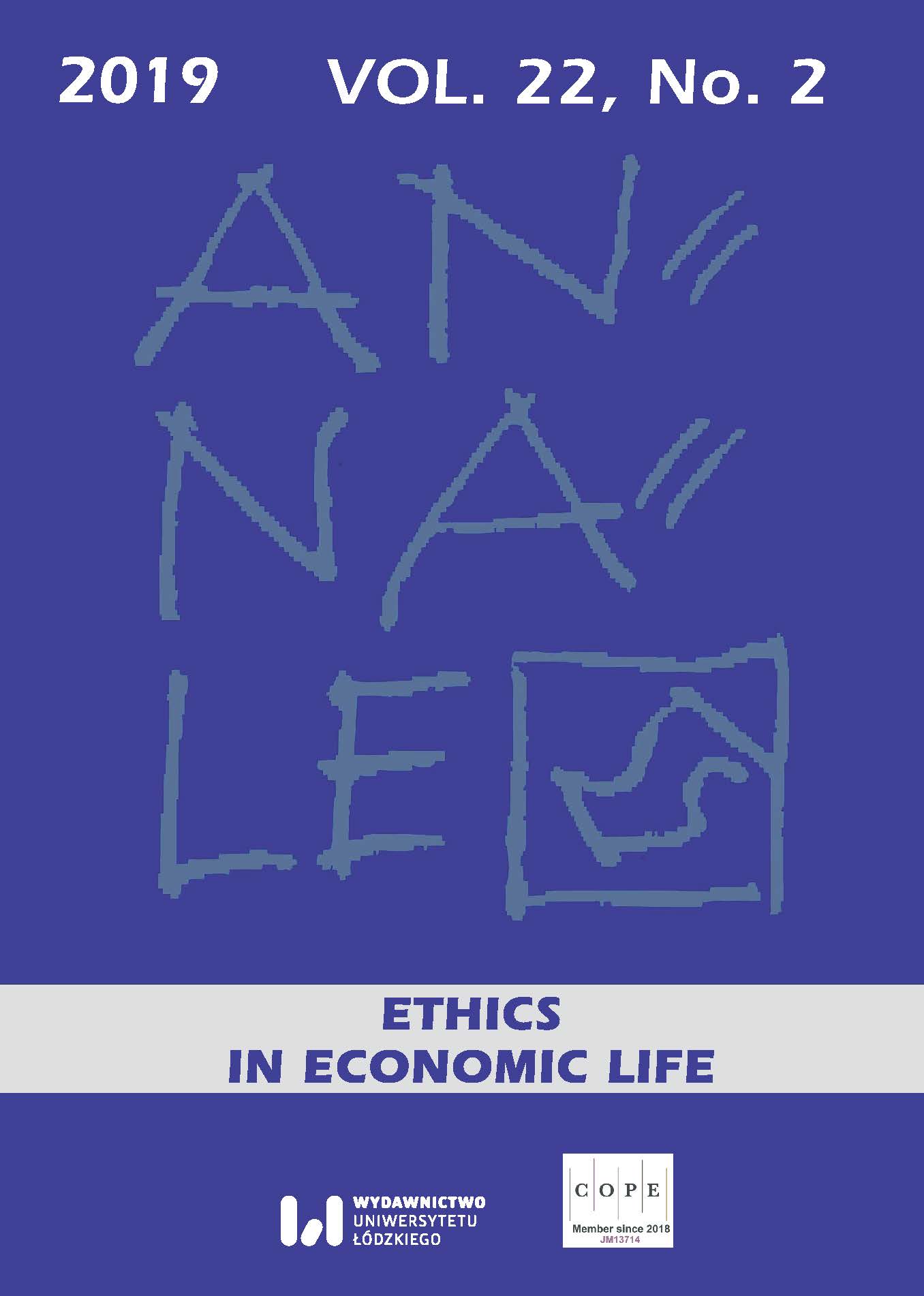Firma jako wartość dla przedsiębiorcy
DOI:
https://doi.org/10.18778/1899-2226.22.2.06Słowa kluczowe:
non-material value (intangible), company material value (assets), entrepreneur, family company, social responsibility of business, entrepreneurshipAbstrakt
In this paper I propose to show a problem that at first sight seems clear, and thus “non-scientific”; however, after a closer look at the source material, it proves to be an important factor for contemporary entrepreneurs conducting business activities. The scientific issue is encapsulated in a concise statement: the company as a value for the entrepreneur. In order to develop the presented thesis, one must point to the fact that a company that has been established by an entrepreneur has a particular value for him, both in the material sense (its valuation on the market), and in an immaterial sense (as a symbolic value). It seems that the symbolic value greatly exceeds the material value, if we consider the entrepreneur’s perspective. Analysis of the value of a company throughout the research allows us to perceive it as the actual fulfillment of an entrepreneur’s life plans, as a workplace and a family value (frequently called the family gem). The enterprise, which is at the same time a brand, is very often the entrepreneur’s brand certificate. The social involvement of the entrepreneur and the formation of an integrated, loyal team of employees are also values in themselves. Considering the non-material value, the enterprise allows the entrepreneur and the employees to meet their needs of self-realization and appreciation. The paper was prepared based on an analysis of answers entrepreneurs gave to specialist periodicals and popular dailies. In addition, I have used my own research, conducted in 2017, among entrepreneurs who represent the small and medium enterprise sector located in towns and villages.
Bibliografia
Co zmienić w polskim systemie podatkowym. (2019). Forbes, 2, 106–107.
Google Scholar
Córce ufam bezgranicznie. Zbigniew Grycan przygotowuje Małgorzatę do przejęcia sterów, sam jednak nie zwalnia tempa. (2017). Forbes, 12, 20–24.
Google Scholar
Czerniak, A., Haponiuk, H., & Kąsek, L. (2018). Przedsiębiorca odczarowany. Kim są twórcy polskiej gospodarki? Warszawa: Polska Rada Biznesu.
Google Scholar
Dusza z ciała biznesmena. Z Jackiem Santorskim rozmawia Piotr Gruszczyński. (2005, 27 marca). Tygodnik Powszechny.
Google Scholar
Fukuyama, F. (1997). Zaufanie. Kapitał społeczny a droga do dobrobytu. Warszawa–Wrocław: Wydawnictwo Naukowe PWN.
Google Scholar
Góralczyk, P. (red.). (2013). Myśli o… pracy. Forbes, 11, 212.
Google Scholar
Jak podtrzymać polski cud gospodarczy. (2019). Forbes, 02, 100–101.
Google Scholar
Jasiecki, K. (2013). Kapitalizm po polsku. Między modernizacją a peryferiami Unii Europejskiej. Warszawa: Wydawnictwo Instytutu Filozofii i Socjologii Polskiej Akademii Nauk.
Google Scholar
Kamosiński, S. (2018). Sektor małych i średnich przedsiębiorstw a społeczna odpowiedzialność biznesu. Raport z badań własnych przeprowadzonych w gminie rolniczej. Marketing i Rynek, 11, 191–201.
Google Scholar
Karnaszewski, P. (2019). Polskie firmy ruszyły na łowy za granicą. Forbes, 02, 74–81.
Google Scholar
Mackiewicz, A. J. (2010). Psychologia zwolnień. Jak właściwie prowadzić działania derekrutacyjne. Warszawa: Difin.
Google Scholar
Nie było wyjścia, musieliśmy sami sobie poradzić. Piotr Voelkel z rodziną. (2017). Forbes, 1, 26–30.
Google Scholar
Nie jestem pazerny. Zbigniew Jakubas o tym, jak się robi biznes w Polsce, rozmawiali Piotr Karnaszewski i Filip Kowalik. (2018). Forbes, 6, 22–30.
Google Scholar
Nie muszę być najmądrzejszy w firmie. Rozmowa Macieja Drzewickiego i Grzegorza Kubickiego z Leszkiem Gierszewskim, prezesem firmy Drutex. (2016). Gazeta Wyborcza, 3–5.
Google Scholar
Niektórzy wolą raczej zginąć, niż się zmienić. Prof. Krzysztof Obłój w rozmowie z Piotrem Karnaszewskim. (2017). Forbes, 12, 50–58.
Google Scholar
Obłój, K. (2017). Praktyka strategii firmy. Jak zarządzać przeszłością, radzić sobie z teraźniejszością i tworzyć przyszłość. Warszawa: Wydawnictwo Poltext.
Google Scholar
Twarzy wam nie pokażę. Ale wnętrze bez oporów. Rozmowa Eryka Stankunowicza z Markiem Piechockim. (2019). Forbes, 02, 28–38.
Google Scholar
U mnie wszystko jest przemyślane. Z Danielem Mzykiem rozmawiał Filip Kowalik. (2018). Forbes, 12, 26–36.
Google Scholar
Z węglem Polsce nie do twarzy. Z Jennifer Morgan rozmawia Paulina Reiter. (2018). Gazeta Wyborcza, nr 280.9494.
Google Scholar
Za 50 lat to wciąż będzie nasz biznes, Zbigniew Juroszek z synem. (2017). Forbes, 12, 37–39.
Google Scholar
Zasiadczyk, A., & Krasicki, A. (2016). Polskie firmy rodzinne. Warszawa: Wydawnictwo Muza.
Google Scholar
Zielewski, P. (2018). Ludzie są najważniejsi. Raport McKinsey i Forbesa jak wykorzystać potencjał automatyzacji. Forbes, 6, 82–84.
Google Scholar
Pobrania
Opublikowane
Jak cytować
Numer
Dział
Licencja

Utwór dostępny jest na licencji Creative Commons Uznanie autorstwa – Użycie niekomercyjne – Bez utworów zależnych 4.0 Międzynarodowe.









